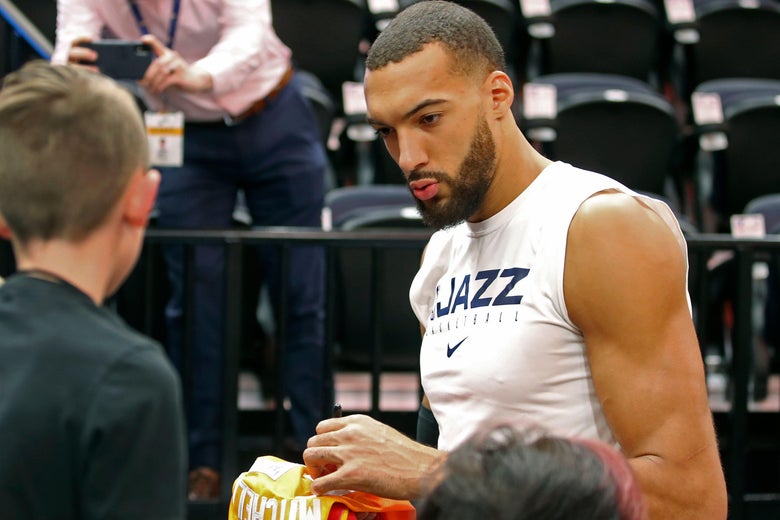
Utah Jazz center Rudy Gobert signs autographs after warm ups, before a NBA game against Los Angeles Lakers in Salt Lake City, Utah on December 4, 2019.
George Frey/Getty Images
In two weeks, the PGA Tour will hold its first tournament since the coronavirus shutdown, and around 140 golfers will be walking the Colonial Country Club golf course in Fort Worth, Texas. Other sports organizations, including the NBA and NHL, are expected to follow suit in the near future.
Of course, any effort to restart sports will rely on widespread testing and other safety measures. But even the most rigorous testing regime is not immune to errors, and athletes’ conditions may change over time. This will require sports organizations to grapple with yet another dilemma: how to regulate the disclosure of nonpublic information about an athlete’s COVID-19 status. After all, the health of an athlete may be useful in assessing a player’s or team’s future prospects. And if that information were to make it into the hands of a gambler before news broke publicly, it would provide a significant advantage.
There are two sets of regulations that are most relevant to such a hypothetical situation. First, sports leagues often require teams to periodically and publicly report the injury status of their players. COVID-19, however, presents unique challenges to this regulatory framework, even without considering privacy issues. The nature of the coronavirus—its devastating impact, as well as the fact that it is highly contagious and can be invisible until symptoms appear—makes it difficult to release accurate, real-time information about an athlete’s health and opens the door to the manipulation of information.
The case of Utah Jazz center Rudy Gobert is illustrative. In March before the shutdown, on the morning of a game, Gobert was tested and his team reported him as “questionable” since, even though the results weren’t back, he had previously shown symptoms. That report prompted speculation in both traditional and social media about Gobert’s condition. In a fortuitous turn of events, the league canceled the game at the very last minute. (In fact, the National Anthem had already been sung). But had the game not been canceled, gamblers who were aware of Gobert’s exact condition would have had better information than others. This situation will likely arise again, even if testing improves and games resume in a “bubble city.” In addition, information about athletes who have already recovered may enable gamblers to predict which teams or athletes will be least affected by the virus.
The second relevant set of regulations prohibits athletes from “tipping”—i.e., disclosing inside information that might be used by gamblers. The NBA, WNBA, NFL, LPGA, NCAA, and PGA Tour are among the sports organizations that have established such rules. All of these rules pertain, either explicitly or implicitly, to information about an athlete’s health. But this mechanism also presents issues when it comes to COVID-19.
One source of concern is the broad and vague language used in the anti-tipping rules. Some of these rules don’t define core terms, such as “nonpublic information.” Others use ambiguous standards such as “legitimate business need for the information.” Perhaps most important, some of these rules apply even in circumstances where there was no intent to manipulate betting. The PGA Tour, for example, prohibits golfers from disclosing information that they “knew would be used, or should have known would be used, for betting.”
The broad and vague language of these rules might lead to unjust disciplinary actions against athletes. Consider, for example, the following scenario: During a telephone conversation with a friend, an athlete reports that, oddly, she just lost her sense of smell. Knowing that this could be an early sign of infection, the friend hurries to the closest casino and places a bet against the athlete’s team. Does this mean that the athlete violated the rule against tipping? Under some interpretations of the rule, the answer to this question is not clear.
Given the potential consequences, it is easy to see why athletes would err on the side of caution, and why these rules might deter athletes from disclosing information, even in situations where such disclosure is benign or desirable. In the case of COVID-19, for example, an athlete who would otherwise notify all of her contacts of an infection might now hesitate to do so. And this could be significant even in a “bubble city” scenario, given an athlete’s potential contact with the public (e.g., hotel clerks, waitstaff, etc.)
So what’s the answer? A number of sports organizations around the world have already narrowed the applicability of their anti-tipping rules. England’s Football Association, for example, imposes disciplinary actions on soccer players only if the disclosed information is used “for, or in relation to, betting.” Similarly, the leading international tennis associations punish athletes if they personally receive money or other consideration in return for providing inside information.
Perhaps the best solution can be found in state law. More than 15 states have recently legalized sports betting, and some of those laws and regulations address the issue of tipping in a different way. For example, they may monitor “suspicious betting” or prohibit gamblers from using information that was acquired “unlawfully.” What these provisions have in common is that they focus on gambling operators and gamblers—the potential tippees—rather than on sports personnel—the potential tippers.
My own view is that we need a hybrid solution: clarify the ambiguities and shift the spotlight to the tippees. This issue needed to be better addressed prior to the COVID-19 outbreak, but now is certainly the time to do it.
This piece is based on a recent article “Gambling on Disability Rights,” published in the Columbia Journal of Law & the Arts.
Readers like you make our work possible. Help us continue to provide the reporting, commentary, and criticism you won’t find anywhere else.
Join Slate Plusfrom Slate Magazine https://ift.tt/2TJh0Nw
via IFTTT
沒有留言:
張貼留言